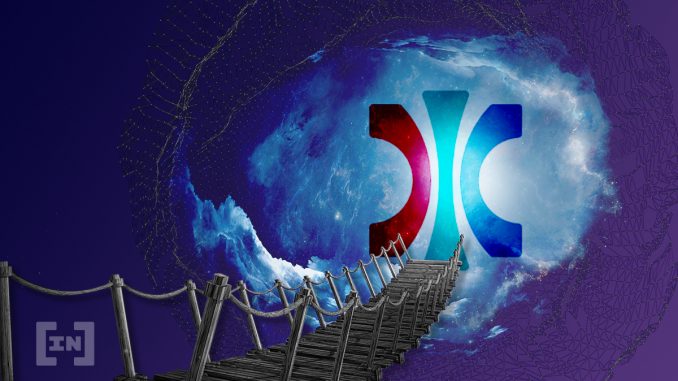
Wormhole, a Solana Labs-backed multichain connector, launched its mainnet. This new protocol aims to bring the key issue of interoperability to the forefront of the DeFi conversation.
In a world increasingly open to innovation and fast-paced development, communication is of the utmost importance. That’s the ethos of the multichain connector Wormhole. The company intends to use its technology to make communication between different blockchains effortless.
Wormhole’s technology makes it possible for funds, votes, programs, and any other transferable information to effortlessly pass from one blockchain to the next. Their ecosystem accomplishes this via a trustless protocol, which is then validated by 19 unique guardians.
Through independent validation, Wormhole aims for trustless and secure protocol procedures. As a result, the launch of Wormhole 2.0 now allows for complete generic communication between the Solana, Terra, Ethereum, and Binance Smart Chain ecosystems.
The update improved efficiency and wider communication capabilities. Since Wormhole 2.0 separates the protocol from application logic, more messaging applications have the opportunity to communicate without making major changes in each instance.
Simplified interoperability between blockchain networks is a highly welcomed development from the applications Wormhole supports.
The case for interoperability
The decentralized space is rife with buzzword interoperability, especially with the boom created by NFTs as more people join the space and innovation surges. As a result, the fewer communication barriers, the better.
At the moment, the siloed nature of multiple blockchains has made it hard for users to create a holistic ecosystem. While there is an element of competition, it also results in a frustrating user experience of the DeFi space in general.
In a previous discussion with BeinCrypto, RioDeFi CEO James Anderson expressed the importance of interoperability for the future of DeFi is essential.
“We also think that the future of blockchains is all about interoperability,” he said.
Wormhole’s latest network update is the most recent among a variety of attempts to provide a solution to this problem. DeFi platforms like RioDefi, Cosmos, and SwipeChain are just some others also tackling this issue.
However, for Wormhole specifically, the focus is simplifying support for cross-chain messaging between contracts, like NFT swaps.
Solana Labs is the creator of one of the networks now able to operate via Wormhole. Recently, more NFT marketplaces have been migrating to the Solana network. The new opportunity for information flow is a big plus for Anatoly Yakovenko, CEO of Solana Labs.
“Trustless bridges like Wormhole represent the forefront of interoperable blockchain infrastructure. Wormhole can create new corridors for information to flow between blockchains, and unlock billions of liquidity and new value across all asset classes.”
Do Kwon, Co-Founder, and CEO of Terraform Labs, also welcomes the Wormhole update as an opportunity for the future of Terra stablecoins.
“We believe in an interchain future and by creating an easy, scalable way to transport liquidity and messages across blockchains.”
Before the launch, Neodyme, a prominent blockchain security firm, audited the new Wormhole 2.0 protocol.
A new development for DeFi
The Wormhole 2.0 upgrade suits the expansionist nature of the DeFi space. The generic essence of the platform enables users to build functionally for the transfer of data, tokens, and any other use cases.
DeFi platforms such as Solana and Terra are on board with the vast expanse of possibilities this update presents their networks.
Solana’s decentralized exchanges (DEX) recently welcomed major data aggregation from Step Finance. It was a big development for Solana as the platform continues to gain momentum in the DeFi space. Many users make the switch to SOL as a less expensive alternative to ethereum.
Last month, the Terra ecosystem received multi-million dollar funding towards the network’s decentralized finance (DeFi) Ecosystem Fund.
The DeFi space broadens the financial possibilities to people who may otherwise not have equal footing in traditional financial spaces. The launch of Wormhole 2.0 falls in line with expanding those possibilities.
Hendrik Hofstadt, the Direct of Special Projects of Digital Assets at Jump Trading Group, commented that the DeFi market made space for Wormhole’s latest developments. “The thriving DeFi market created demand for a generic messaging protocol that could operate at a much broader scale.”
Hoftstadt believes the versatility of the platform’s upgrade will benefit DeFi innovators.
“Wormhole 2.0 maintains the simplicity of the original protocol while acting as a more versatile building block for the space. It will be exciting to see how dApps and platforms will innovate with this new multi-chain bridge.”
As the DeFi space expands, platforms such as Wormhole will be an even more welcomed component to the community.
Disclaimer
All the information contained on our website is published in good faith and for general information purposes only. Any action the reader takes upon the information found on our website is strictly at their own risk.






Be the first to comment